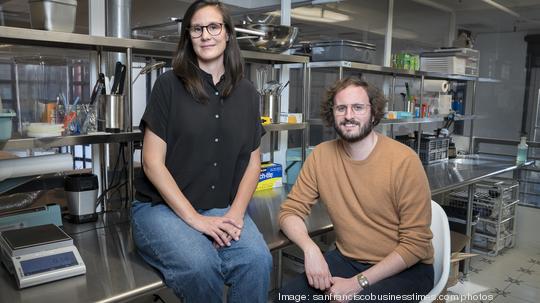
Emeryville alternative seafood outfit Finless Foods is building an 11,000-square-foot pilot facility to produce cell-cultured bluefin tuna and plans to launch this summer its first product, a plant-based tuna substitute, the company announced this week along with a $34 million funding round.
Like others in the cell-cultured protein space, Finless is ramping up production capabilities in anticipation of the first U.S. regulatory approval for its cell-cultured products, perhaps by later this year, placing its initial bets on cell-cultured tuna and later branching into other species. But unlike those companies — with the exception of San Francisco's Eat Just, Inc. — Finless is dual-tracking that development, directing the new capital into rollout of its plant-based tuna (which, atypically, uses a melon variety rather than a pea or soy base) to food-service channels including colleges ("a natural fit," the company said) and restaurants.
Plant-based protein alternatives are already on the market and will enable the company to begin earning revenue for the first time while it navigates the red tape and develops its cell-cultured tuna.
Finless Foods expects to move into office space at the new facility next month and for construction to wrap up within six months, quadrupling current R&D space, while plans progress on a future larger production plant. The site will only produce the cellular product while the plant variety is made at a co-manufacturing facility in the region.
The Series B round was led by Korean conglomerate Hanwha Solutions and featured funds from Japanese seafood company Dainichi Corp, At One Ventures, Olive Tree Capital, Twitch co-founder Justin Kan and the Sustainable Ocean Alliance, among others. It brings the company's total funding to $48 million since it was founded in 2017 by CEO Michael Selden and Brian Wyrwas, who identified an opportunity as the seafood market sees the global depletion of wild-capture tuna stocks.
The funding news arrives fresh off the heels of local cellular seafood competitor Wildtype announcing a $100 million Series B last month (with funds from Cargill, Leonardo DiCaprio, and affiliates of Jeff Bezos and Robert Downey Jr.). Operations launched last summer at its own pilot plant for cell-grown salmon in San Francisco's Dogpatch neighborhood.
This week local competitor Upside Foods opened public tours of its $50 million cell-cultured meat facility, also located in Emeryville, and which spans 53,000 square feet with industrial scale production.
Finless Foods' Chief Strategic Officer Shannon Consentino-Roush told me that Hanwha's leadership of this funding round has strategic significance, giving her company a window into the South Korean regulatory frameworks for plant- and cell-based meat and, with Hanwha's clout as a multinational conglomerate, the reach to build relationships across Asia.
East Asia represents a huge market opportunity for production, consumption and regulatory breakthroughs for alternative seafood given the precedence of Singapore's global first legalizing cell-cultured meat sales and with Japan one of the countries deepest into investment and regulatory framework discussions, along with Israel and the United States, as well as the country arguably most impacted by overfishing. As evidenced by Hanwha, investors in another globally significant seafood market in South Korea are also getting into the game.
"Given the climate change facing our planet, we believe cellular agriculture will become the future of food production," a spokesperson for Hanwha Solutions said in a press release.
While there was optimism from industry players such as local Upside Foods that a U.S. regulatory pathway could open by the end of 2021 that ultimately didn't materialize. Consentino-Roush said she feels there is bound to be substantial movement this year — whether that's in new U.S. federal guidelines for the industry, market entry by more companies and products in Singapore (still the only legal cell-cultured market, and only for Eat Just chicken), or moves in the post-Brexit United Kingdom or the Netherlands.
Consentino-Roush added that the global jockeying for the first real cell-cultured consumer market doesn't go unnoticed by U.S. regulatory bodies, or for that matter, lawmakers.
"There's this emphasis on American innovation and leadership, and that's what resonates with Capital Hill," she said.






